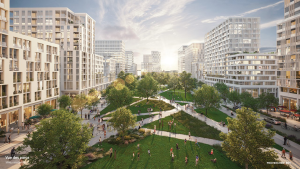OTTAWA — The four winners of the country’s first-ever Smart Cities Challenge, announced recently, will receive prizes worth a total of $75 million which will be used to implement their proposals.
The pan-Canadian competition encourages communities of all sizes to harness the potential of connected technology and data to improve the lives of Canadians.
The winners are:
- Town of Bridgewater, Nova Scotia — $5 million prize for its proposal to reduce energy poverty;
- Nunavut Communities, Nunavut — $10 million prize for its proposal to use a life promotion approach to suicide prevention;
- City of Guelph and Wellington County, Ontario — $10 million prize for its proposal to create a Circular Food Economy; and
- City of Montreal, Quebec — $50 million prize for its proposal to improve mobility and access to food.
When the Challenge was launched in November 2017, more than 200 communities from across Canada responded including large metropolitan areas, small towns and Indigenous communities.
Of the 130 applications received, 20 were selected as finalists on June 1, 2018, and received grants of $250,000 to develop their proposals into fully-implementable business proposals.
Over the past year, the 20 finalists have been working intensely with their residents and partners to turn their bold ideas into real, practical plans, indicates a release issued by Infrastructure Canada, adding they have defined the smart city concept in a truly Canadian manner, and have come up with homegrown solutions that will benefit communities across the country as they develop their own visions.
Final proposals were submitted on March 5, 2019, and were evaluated and assessed by the independent Smart Cities Canada jury consisting of 13 members based on the criteria set out in the Smart Cities Challenge Finalist Guide.
The four winners will implement their smart cities approaches over the next five years. Updates on their implementation will be posted on Infrastructure Canada’s website.
“Congratulations to finalists and winners of Canada’s first-ever Smart Cities Challenge,” said Minister of Infrastructure and Communities Francois-Philippe Champagne. “The work you have put into developing your proposals and to improving the lives of your residents is huge. You are all winners! Your efforts will benefit your communities, and also communities across the country who may be facing similar challenges. You are shining examples of Canadian ingenuity and innovations at its best and I am immensely proud.”











Recent Comments
comments for this post are closed